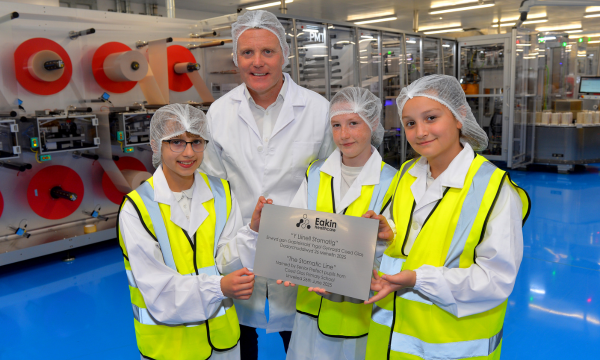Businesses with creative ideas to boost the UK’s manufacturing capabilities, including using robotics, AI and augmented reality, are set to receive £300m of joint UK Government and industry funding.
Through the Manufacturing Made Smarter Challenge, the UK Government will invest £147 million – backed by further funding from industry – to support businesses implement new tech to boost their manufacturing productivity, helping them reach new customers, create thousands of new highly skilled jobs, slash carbon emissions and reduce prices for consumers.

The first £50 million of the funding is being allocated to fourteen cutting-edge manufacturing projects involving around 30 small or medium businesses, 29 larger enterprises and nine universities, with the rest of the funds due over the next five years.
Dialog, a winning project based in Flintshire, brings together affordable, automatic and human-interacting robots to help machines make quicker and better decisions, making production more efficient.
Business Secretary Alok Sharma said:
“The Welsh manufacturing sector is a vital part of the UK economy, and backing businesses’ ground-breaking projects to boost productivity will help to drive our economic recovery.
“Supported by UK government funding, project DIALOG in Flintshire will bring together the latest in robotics technologies to develop a more efficient and agile approach to UK manufacturing.”
Secretary of State for Wales Simon Hart said:
“The UK Government is committed to expanding Wales’ manufacturing capabilities and encouraging innovation.
“By building on Wales’ existing industrial excellence, Welsh businesses can play a vital role in the next generation of manufacturing.
“Our aim is to create a strong and resilient economy in Wales and manufacturing is central to this vision.”
Other winning projects include:
- WeldZero (West Midlands): This project will explore the use of robots, sensors and automation to improve accuracy when welding metal parts on production line. The machines will also collect and feedback valuable data to help improve the manufacturing process, leading to stronger and higher-quality parts, as well as quicker production, in industries including automotive and construction.
- Smart Connected Shop Floor – real-time data integration with multi-sector applicability (Bristol): GKN Aerospace is leading a cross-sector team trialling digital technologies, including augmented reality headsets for engineers, so manufacturing businesses can guide them through repairs. The project will also use ‘smart’ devices to exchange information between old and modern computer systems.
- The Digital Sandwich – Digitised Food Supply Chain (Chelmsford): Raynor Foods Ltd, a leading UK sandwich supplier who helped supply the NHS during the coronavirus pandemic, is creating a major piece of software where food and drinks businesses can connect online to share valuable data. This information exchange will increase productivity, improve cashflow, help boost food quality and reduce waste within in the supply chain. The platform includes SMEs, who don’t usually have access to this kind of technology and will benefit sectors including pharmaceutical, aerospace and automotive.
Today’s funding was announced at London Tech Week – an annual event celebrating innovation, talent and development of the tech sector.
The Manufacturing Made Smarter programme will also support technology Small and Medium Sized Enterprises (SMEs) through growth accelerators – partnerships between the government and the private sector where experts will work with businesses to identify barriers to growth and ways to overcome them. It will also create a national network of innovation ‘hubs’ where businesses can partner or share advice, to help spur growth and creative ideas.
This announcement follows the opening of a competition in July under Manufacturing Made Smarter: Digital Supply Chain, where firms of all sizes can apply for up to 70% of the funding they need for industrial research projects.
The UK Government has committed to raising productivity and earning power in the UK by spending 2.4% of GDP on R&D across the UK economy by 2027.







